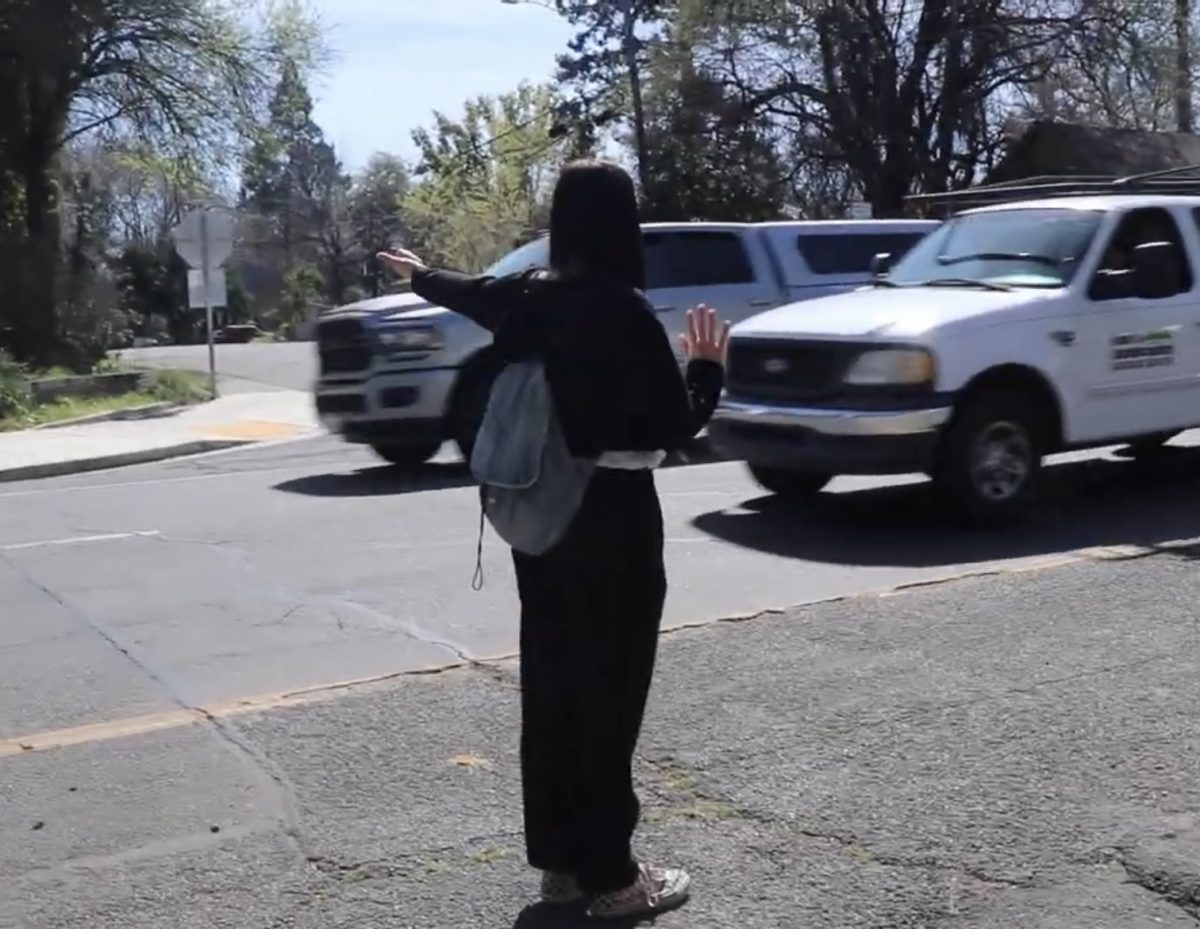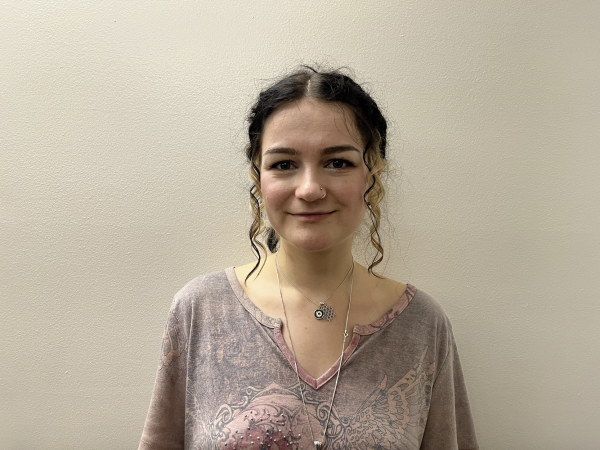This article will dive into my own experience and fascination with hitchhiking. To see what our hitchhiking experience looked like, click the video above or use this link.
Within seconds of sticking out my thumb on the corner of Eighth and Chestnut Streets, a woman in a small red car pulled over and asked if I needed a ride.
The woman, who went by “She,” would be the first of three people to stop for my fellow reporter Nathan and me as we attempted to hitchhike for an hour in Chico. Nathan The Orion’s sports editor stood by filming while I stuck out my thumb and smiled at cars.
Other than She, a kind older woman and a man who recently immigrated from the Middle East picked us up.
Hitchhiking is illegal — kinda. Requesting a ride from a stranger at a truck stop or parking lot is perfectly legal. However, you can’t stand on the side of a road and flag down a moving car for a ride, which is hitchhiking.
The law seems to be aimed more at preventing the inconvenience of stopping traffic, rather than deterring the practice altogether.
Why????
I told a professor of mine I went hitchhiking for a story after Nathan and I completed our field work. She asked me, “Where are you from? Who raised you?” with a tone of genuine concern.
Growing up I watched a lot of VICE videos on YouTube. “Thumbs Up,” David Choe’s hitchhiking series, hugely inspired me. Seeing him hop trains, ride down the Mississippi River on an inflatable raft and get picked up by countless strangers was awe-inspiring. I wanted a small taste of that for myself.
When you hitchhike, you are exercising an incredible amount of trust in the world.
There are two cliche extremes on the hitchhiking scale. You are either getting the friendliest, sweetest salt-of-the-Earth person who wants to help you out, or someone who wants to rape and murder you.
The uncertainty of the practice offers a unique thrill. You never know what you’re going to get.
I also just love people, and what I found hitchhiking was that the people who picked me up also love people. In a way, hitchhiking is asking someone for help, which can bring out the humanity in people.
To answer my concerned professor’s question, I’m from Palmdale, a suburb in the Mojave Desert. Though my loving parents raised me, so did YouTube and the internet as a whole.
Danger
As a woman, there is an expectation that bad things will happen to you in life if you aren’t extra careful. That’s to say, an already dangerous activity is made more dangerous if a woman does it, rather than a man.
To prepare for our foray into random strangers’ cars, Nathan and I packed a bag of safety and convenience items. Some items of note included two knives, pepper spray and cigarettes for potential ride bartering.
Unless I ever lose all will to live, I will never hitchhike alone. Having Nathan with me was essential and — perhaps naively — alleviated most of my worries that things could go wrong.
We had a code word, “newsroom” incase we felt like we couldn’t trust our driver. We didn’t have to use it.
I’ve tested the limits of safety at times: walking home alone late at night, traveling alone in foreign countries, accepting drinks from strangers, accepting … edible items from strangers, etc.
Still, I have my limits. I would prefer not to die, so for now I’ll be hitchhiking with men.
As much as I love my body and feminine traits, I envy the freedom men possess. That’s not to say that nothing bad happens to men. However, women are more often victims of sexual assault, which is what I fear might happen to me if I were to hitchhike alone.
All that said, hitchhiking doesn’t really seem as dangerous as people say it is. Yes, you probably have a story of someone who knows someone who had something bad happen to them while hitchhiking. However, everyone also seems to have a story of that one friend that hitched everywhere and had a great time, “because that’s just how things were back then.”
People do sometimes get murdered. In the ‘70s a few serial killers took advantage of hitchhikers.
Hollywood for sure played a part in exaggerating the dangerous image of hitchhiking.
An NPR article on hitchhiking states, “It’s difficult to tell if real-life hitching crimes preceded their horror movie counterparts, but starting in the 1950s and then gaining traction in the ’70s and ’80s, the psychopathic hitchhiker trope was born.”
It is hard to get statistics on hitchhiking for obvious reasons. This article gives some insight into the dangers of hitchhiking, or lack thereof. However, in the grand scheme of things, the murders are outlier situations.
Look, if there is something you want to do, you should try it at least once. Probably, part of the reason I wanted to hitchhike so bad is because women are especially told not to.
The practice taps into a defiant but also human-trusting part of my soul. I’m not living like Chris McCandless from “Into the Wild” any time soon, but I think a part of me will always want to.
Molly Myers can be reached at mollymamyers@gmail.com or orionmanagingeditor@gmail.com








